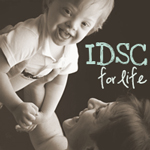First off, I didn't realize it had been so long since the last blog post! Oops! Time flies by, doesn't it?!
A couple parents of kids with DS that I know shared this recent study on EGCG, so I thought I'd share it up here.
The final conclusion of this: EGCG seems to help improve bone mineral density and skeletal problems in individuals with Down syndrome. Pretty cool.
Evaluation of the Effects of Green Tea Extracts on Bone Homeostasis in the Ts65Dn Down Syndrome Mouse Model
Irushi S. Abeysekera1, Jared R. Thomas2, Joshua D. Blazek1, and Randall J. Roper1 1Department of Biology, Indiana-University-Purdue-University, Indianapolis; 2 Ivy Tech Community
College- Central Indiana
Down Syndrome (DS) is a genetic disorder that affects ~1 in 700 live births, caused by trisomy of human chromosome 21 (Hsa21), and results in cognitive impairment, craniofacial abnormalities, low muscle tone, and skeletal deficiencies. To study these phenotypes, we utilized the Ts65Dn mouse model, which contains three copies of approximately half the orthologous found on Hsa21 and exhibits similar phenotypes as found in humans with DS. Individuals with DS and Ts65Dn mice have deficits in bone mineral density (BMD), architecture, and bone strength. Over-expression of DYRK1A, a serine-threonine kinase encoded on Hsa21, has been linked to deficiencies in DS bone homeostasis. Epigallocatechin-3- gallate (EGCG), an aromatic polyphenol found in high concentrations in green tea, is a known inhibitor of Dyrk1a activity. Normalization of Dyrk1a activity by EGCG may have the potential to regulate bone homeostasis and increase BMD and bone strength in individuals with DS. In this study, we hypothesized that EGCG obtained from different sources would have differential effects in correcting bone deficits associated with DS. To test our hypothesis, we performed on EGCG and related compounds from different sources. The LC-MS analysis determined the amount of EGCG and the degradation in our stock solution. Next, we treated three-week- old Ts65Dn and control male mice with EGCG for three weeks. At six weeks of age, mice were sacrificed. DXA and micro CT analysis were performed on the femurs and skulls of the mice to assess trabecular and cortical bone structure and BMD. Our results indicate the ability of EGCG to ameliorate skeletal deficiencies and compared pure EGCG with EGCG purchased from commercial vendors in correcting skeletal deficits associated with DS.
Mentors: Randall J. Roper, Department of Biology, Indiana-University-Purdue-University, Indianapolis

Tweet
Monday, June 17, 2013
EGCG - Green Tea Extract - and Bones
Subscribe to:
Post Comments (Atom)























1 comments:
Great post, I am always amazed by new benefits we discover from different supplements.
Post a Comment